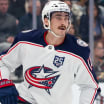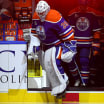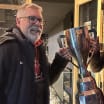He commanded a room just by walking into it.
The late Pat Quinn's presence was as much about his imposing 6-foot-3 build as it was his stature as a man, able to extract excellence from those around him by organizing, directing and trusting them.
Pat Quinn honored for inspiring excellence
Longtime coach, executive being inducted into Hockey Hall of Fame as builder
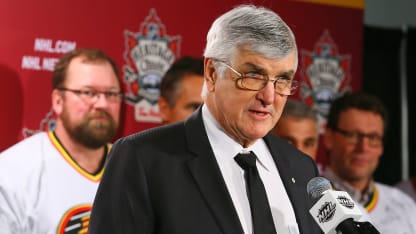
© Graig Abel/Getty Images
By
Tim Campbell
NHL.com Staff Writer
The former coach, general manager and executive with the Philadelphia Flyers, Los Angeles Kings, Vancouver Canucks, Toronto Maple Leafs, Edmonton Oilers and Hockey Canada enters the Hockey Hall of Fame as a builder on Monday, enshrined after a career of guiding and inspiring others to great things.
"He was a general," said Oilers Entertainment Group CEO and vice chair Bob Nicholson, the former president of Hockey Canada. "He made a plan and allowed everyone to work in that plan. It was how he made individuals feel around him, that they wanted to go through the wall for him."
Philadelphia Flyers senior vice president and Hockey Hall of Famer Bob Clarke played against Quinn in the NHL between 1968 and 1977, then played for him when Quinn joined Philadelphia's coaching staff later that year.
"Pat led," Clarke said. "He spoke directly and honestly with you. It's hard to quite describe something like 'presence.' Physically he was a big man, an immaculate dresser and always, when he'd come into a room, it was as if he knew what he was doing.
"There was never any beating around the bush … with Pat. You knew exactly how you stood, and he always did it in a manner that you received it without criticism."
Quinn died on Nov. 23, 2014, after battling illness. He was 71.
He played 606 games as a defenseman for the Toronto Maple Leafs, Vancouver Canucks and Atlanta Flames. He coached 1,400 NHL regular-season games in 20 seasons with a record of 684-528-34 and 154 ties. The 684 wins rank seventh all-time among League coaches.
Quinn coached 183 games in the Stanley Cup Playoffs, winning 94. He reached the Stanley Cup Final in 1980 with the Flyers and in 1994 with the Canucks.
Coaching Canada on the world stage, Quinn is alone in winning gold medals at the Olympics (2002), World Cup of Hockey (2004) and World Junior Championship (2009). He also has a gold from the IIHF World Under-18 Championship (2008) and won the Memorial Cup as a player in Edmonton (1963) and owner in Vancouver (2007).
The NHL teams he coached reached 100 points five times, including three times in Toronto, and he was behind the bench in 1979-80 for the Flyers' record 35-game undefeated streak (25 wins, 10 ties). Quinn won the Jack Adams Award, given to the coach of the year, in 1980 and 1992.
The native of Hamilton, Ontario, was chairman of the Hockey Hall of Fame from Aug. 1, 2013, until his death. He was also inducted into the Order of Canada on Nov. 23, 2012.
"Pat was one of the biggest and most important Canadians through his NHL career," Clarke said. "He wasn't a Hall of Fame player, but his presence and his winning big games, both coaching and managing, with national teams and national junior teams and Olympic teams … he was one of the great Canadian executives in hockey."
None of those triumphs was more meaningful than Canada's win at the 2002 Salt Lake City Olympics.
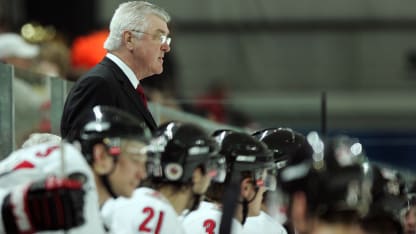
© Elsa/Getty Images
Faced with Canada's 50-year drought of Olympic gold, Quinn faced an immense pressure in trying to redeem himself and the team from the disappointment of the 1998 Nagano Olympics.
"I think it was the most pressure I've ever seen," Nicholson said. "When Pat took the lead in that, I really saw for the first time his character and what he was as a man.
"Pat just cruised through that as the leader. He was the captain of the team, and that's what you need when you have all those superstars."
Wayne Gretzky, executive director of Canada in 2002, said Quinn measured up in every way in the most difficult of roles.
"Pat was one of my favorites," Gretzky said. "We got a chance, an opportunity to really get to know each other in 2000, when I took over the Olympic team. Kevin Lowe [his assistant] and I and Bob Nicholson sat down and said, 'We've got to find a coach that's going to let these guys be themselves, pull them together, and yet be in one direction, and we've got to get this done in nine days.'
"We didn't think there was anybody else that was more qualified to do that.
"He was a wonderful man."
With his clarity and his confidence, Quinn was able to build relationships that worked, especially with players he coached.
"Players trusted him," said Rick Ley, who served as an assistant under Quinn in Vancouver and Toronto. "That's a big thing. He would not throw anybody under the bus."
Brian Burke, whose career as a hockey executive began under Quinn's tutelage in Vancouver in 1987, said players "absolutely loved" a coach who would never embarrass them.
"He never forgot that when he was a player, he didn't want to be [embarrassed]," Burke said. "It was an intellectual, modern approach at a time when a lot of coaches still did the old-school stuff."
Burke said the respect for Quinn was evident "no matter where you went."
"I remember the first road trip I went with him," Burke said. "At the airport in Vancouver, even though we were an hour early, Pat got to the gate right before the flight left. It took him that long to get from security to the gate. Everyone wanted to talk to him. He stopped for everyone. I told him we were going to miss a flight one of these days because of that. He said, 'These people pay our salaries. We stop for them all.'"
Quinn was an innovative coach from the outset.
"When Pat came to Philly as head coach [Jan. 30, 1979], he immediately changed things and it was the biggest change in the game at the time," Clarke said. "It was always a north-south game in North America, and he started bringing wingers off the boards cutting through the middle with the center filling in there, and all of a sudden a very average team in Philly went to the Stanley Cup Final. And of course, other teams followed. He was the first guy to do that.
"[Scotty] Bowman did it in Montreal with Guy Lafleur, who had the freedom of the whole ice, but he was the best player in the game. With us, Pat used the whole team, the whole surface. He was a coach you loved to play for, an attack coach.
"He was way ahead of his time."
Burke saw the same qualities when he worked for Quinn.
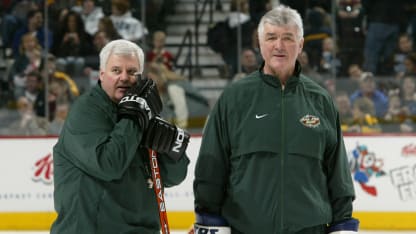
"His image was as a big, tough, old-school Irishman, but he was exactly the opposite," Burke said. "He was a wonderful man, innovative and a pioneer. He said, 'If you can come up with an idea that helps us win games, I don't care if it's new, purloined from another team, we'll take all the information we can to make us better.'
"I went to training camp with four different NFL teams. He wanted to see what they were doing. Pat didn't want best practices in the NHL, he wanted best practices in pro sports."
Watters said Quinn would not bend to popular traps and defensive schemes during those winning Toronto seasons.
"I think I'll remember him as a guy who did it his way," Watters said. "Pat would always say the beauty of this game should not be obstructed by a trap or left-wing lock … that we would not resort to any chicanery or trickery, that this is a beautiful game and as a coach, I have a responsibility to keep it beautiful. And he would call it a beautiful game a lot. I think if I was to put one phrase on him, I would say: 'The proponent of hockey the beautiful way.'"
When Quinn took over as president, GM and eventually coach in Vancouver, Stan Smyl was captain. Smyl said he has his eyes opened in terms of communication and teaching from a coach.
"And on the other side of it, he was one of the funniest guys I've met," Smyl said. "The stories he brought and the jokes; there were many after games and with that cigar, it made things a lot of fun. He made sure that was in the dressing room."
Nicholson said that was one of the highlights of his personal friendship with Quinn, which included their families sharing much of their last 10 summers together in Penticton, British Columbia.
"The best times were sitting at the end of Stan's dock with a cigar, telling stories with Pat," he said.
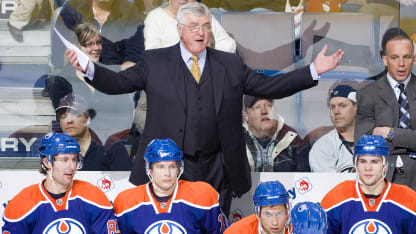
© Andy Devlin/Getty Images
Trevor Linden followed Smyl in the captain's role in Vancouver, for seven seasons in his 19-season career. On April 9, 2014, he took over as Canucks president.
"He was a great man," Linden said. "We talk about his coaching ability, his playing ability, what he meant to the game, but it's the man. I think of it on a daily basis because 30 years after he took the job in Vancouver, his fingerprints are very much still all over the organization. We still live by the culture that Pat created. It's part of what we are. It's part of who I am."



